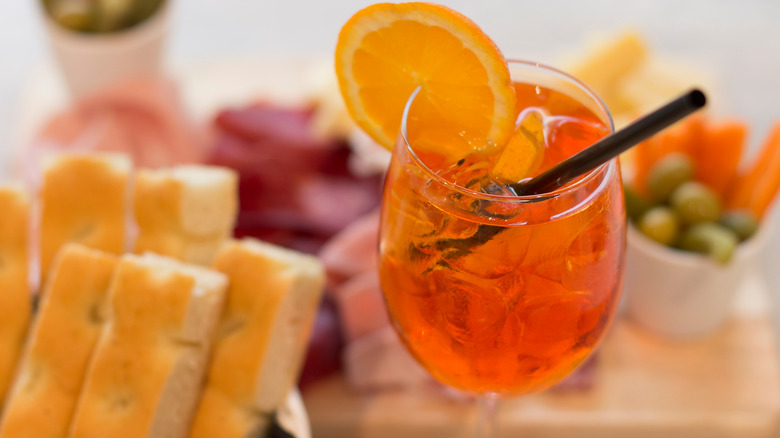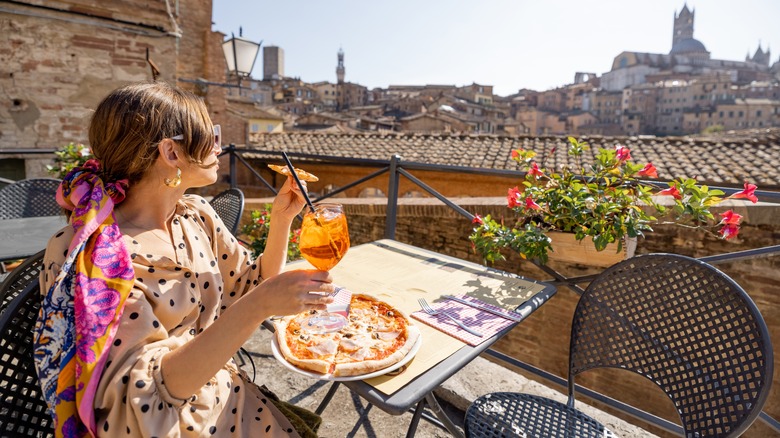It’s totally understandable if you adore spritz (I love it, too) and want to enjoy it with your meals when traveling in Italy. The sublime nectar is like a Roman sunset in a glass: deep luminescent orange, refreshingly cool, a bittersweet ending to a hot summer day. But if you want to blend in with the locals in Italy, please don’t (and I mean don’t) drink spritz with your lunch or dinner. The Italians won’t boot you out of a restaurant for committing this glaring food sin, but they’ll definitely look at you a little funny. And the stricter ones might even send you to confession.
This is because Italians are very serious about their mealtime rituals. It’s not just what they eat and sip, but also how these two activities go together throughout the day. In the morning, they take caffé with their pastry, often at the local bar. With lunch and dinner, the drinks of choice are water and wine. Spritz, on the other hand, is something Italians enjoy during aperitivo, which is sort of like U.S. happy hour. This is the one and only time during the day when you’ll see locals drinking these famous fruity beverages.
When to drink spritz in Italy

Similar to the evening ritual passeggiata, or leisurely stroll, the aperitivo is an important tradition enjoyed throughout Italy, from the Dolomites to the heel of the boot and even on the islands, often between 6 p.m. and 8 p.m. The ritual emerged in the late 1700s in Italy as a relaxing lead up to a more formal dinner. An aperitivo usually combines a snack, like bread, cured meats, cheese, and/or olives, with a cocktail. Beverages like Aperol or Campari spritz are well-suited for an aperitivo because the bitter herbs in them tend to stimulate the appetite. Aperol and Campari are similar, except that the latter is dark red rather than bright orange and more intensely bitter.
In contrast to a meal, an aperitivo is often taken at a bar in a sociable setting rather than a formal restaurant. The absolute best setting for an aperitivo is outdoors somewhere, in a lively piazza or on a terrazza overlooking the ocean, your spritz glowing like a liquid fireball in the Italian sun. If you visit Italy regularly, you might even find a few treasured aperitivo spots in your favorite towns and cities that you return to again and again — your own travel ritual.
Italian-approved beverages to accompany your meal

So what should you drink with your meals, then, to avoid becoming the dreaded recipient of Italian side-eye? Not spritz, but water is always a good choice, and still (acqua naturale) and sparkling (acqua frizzante) are both perfectly acceptable. Many Italians also enjoy wine with lunch and dinner, and most aren’t persnickety about traditional wine and food pairing.
Technically, to get the most out of your meal, you should drink whites with seafood and poultry-based dishes and reds with heavier, meat-based ones. But if you feel like ordering a tannic red Barbaresco with your spaghetti alle vongole, go for it. Most likely your Italian server won’t bat an eyelash.
One approach to choosing wines that pair best with meals in Italy is to try something local. When in the enchanting, hilly region between Venice and the Dolomites, definitely order Prosecco, Italy’s most famous sparkling white wine. But when visiting a lesser-known region like Basilicata, treat your palate to something totally different, such as a peppery red Aglianico.

